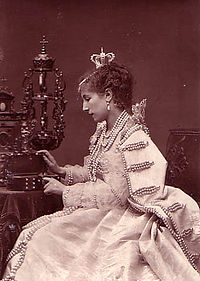Ruy Blas
by Victor Hugo
The scene is Madrid; the time 1699, during the reign of Charles II. Ruy Blas, an indentured commoner (and a poet), dares to love the Queen. The play is a thinly veiled cry for political reform.
The story centers around a practical joke played on the Queen Maria de Neubourg, by Don Salluste de Bazan, in revenge for being scorned by her. Knowing that his valet, Ruy Blas, has secretly fallen in love with the Queen, and having previously failed to enlist the aid of his scapegrace but chivalrous cousin, Don César, in his scheme, Don Salluste disguises Blas as a nobleman and takes him to court. Intelligent and generous, Blas becomes popular, is appointed prime minister, and begins useful political and fiscal reforms, and conquers the queen's heart. A long speech, 101 lines, in which he contrasts the sordid struggle for sinecures in a decaying monarchy with the glories of Emperor Charles V (King Charles I of Spain), is notable.
Don Salluste returns to take his revenge. The Queen and Ruy Blas are betrayed into a compromising situation by Don Salluste, who, when Don César threatens to frustrate his revenge, ruthlessly sacrifices his cousin to his injured vanity. Don Salluste discloses the masquerade by cruelly humiliating Blas – he commands Blas to close the window and pick up his handkerchief, while trying to explain the condition of Spanish politics. Blas kills him and decides to commit suicide with poison. At his dying moment, he is forgiven by the queen who openly declares her love for him.
